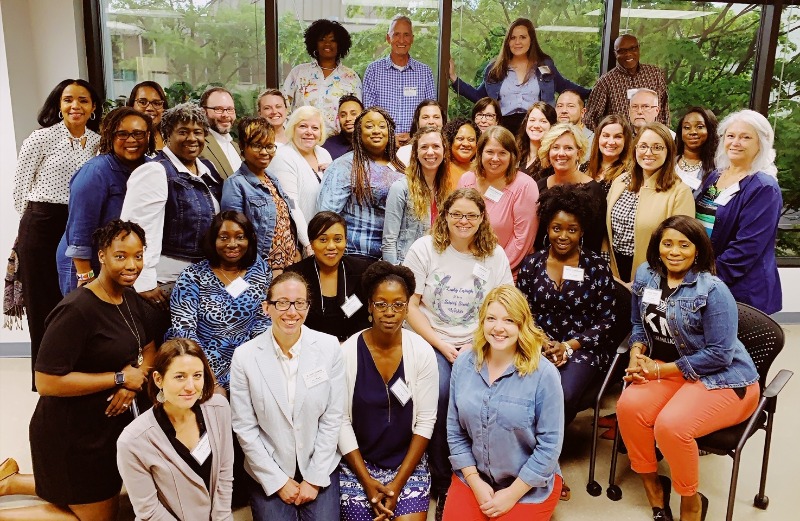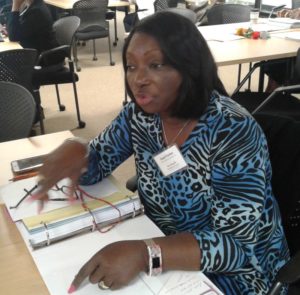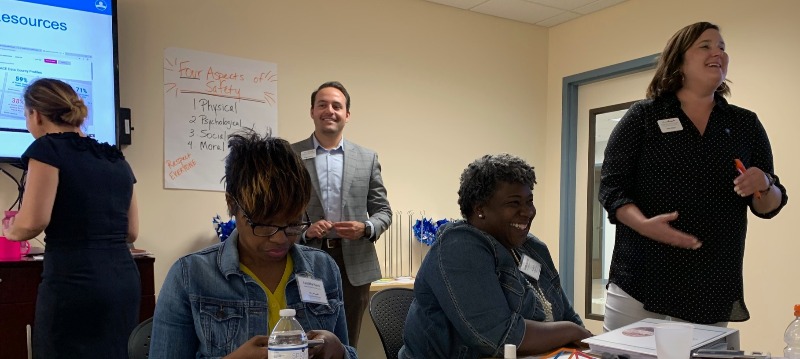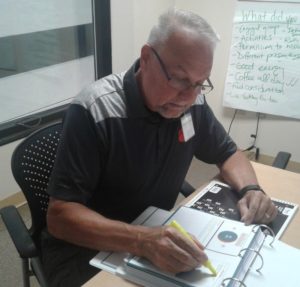As the leader of the South Carolina Adverse Childhood Experiences Initiative, Children’s Trust boosted its number of master trainers across the state with a recent training. Neil White, who tells the stories of Children’s Trust, covered the two-day event.

A recent two-day training increased the number of ACE master trainers around the state to more than 100.
Hazel Blake Parker remembers when she first became aware of adverse childhood experiences – commonly known as ACEs – and the negative impact they can have over the course of a lifetime.
As someone who worked for the S.C. Department of Social Services for 33 years before starting her own training institute in Orangeburg, Parker has seen the effects of childhood trauma firsthand. She completed the recent two-day ACE Interface training in May to become one of 38 new master trainers in South Carolina.
“That was very eye-opening to me,” she said. “It really made me think about my career in social services and understand that’s what happened to my clients.”
Research shows that children who are exposed to trauma like physical and emotional abuse, divorce, substance use/misuse, domestic violence and mental illness are much more likely to become adults with problems like depression, alcoholism, obesity, heart and liver disease, and decreased workplace performance. By addressing the issues of childhood abuse and family dysfunction on the front end, a multitude of health and social problems later in life can be prevented.

Hazel Parker
Children’s Trust is seeking to prevent ACEs in South Carolina by bringing together a network of people committed to improving health and well-being in every community through its statewide ACE Initiative. Parker counts herself among the believers.
“I want to take it back to my city and talk to educators and people-serving organizations,” she said. “That’s where it can have the biggest impact. This knowledge can help us be more proactive on the front end, mitigate these ACEs, and help address mental health, physical health and social issues that can happen later in life.”
This initiative, funded by the BlueCross® BlueShield® of South Carolina Foundation, an independent licensee of the Blue Cross and Blue Shield Association, sends trainers to different groups to talk about ACEs. The initiative also collects and shares ACE data, works to build a prevention planning framework, and promotes sound legislative policy to address ACEs in our communities.
This group of master trainers includes nonprofit professionals, social workers, health care providers, teachers, school administrators, parents, faith-based organization members, and policymakers. Michael Shirley, Children’s Trust community education manager, was especially pleased with the success of this training session.

Michael Shirley (center) guides the ACE training.
“This was our biggest and most diverse group to go through our ACE Interface master training,” Shirley said. “We had a focus of maximizing our program connections and had representatives from all of our programs and coalitions. We also focused on bringing in more trainers from the Pee Dee and Lowcountry areas.
“Trainers still have to complete two trainings to be certified, but if everyone follows through, we will have over 100 master trainers in the program. Overall, everyone seemed really engaged and excited to take this information back to their respective communities and organizations, which is the main goal.”
Participants received information about the original ACE study, South Carolina ACE data, and strategies that empower communities to prevent ACEs. They also learned in greater detail about NEAR science – the fields of study comprised of neuroscience, epigenetics, ACEs and resilience.
The key piece of the initiative, which began in this state in 2015, is training speakers who can deliver this information with consistency across every community in South Carolina. These master trainers work to reach as many people as possible in order to encourage them to take action in their own spheres of influence, whether that be education, health care, government, or nonprofits. This layering of action can then help communities become more informed and build better resources as they work to help children and families thrive.

Chip Green
Chip Green, a licensed professional counselor with a private practice in North Charleston, is an addictions specialist who has learned drugs and alcohol are just a symptom of the real problem. Information about ACEs resonated immediately with him in what he sees occurring later in people’s lives. He believes it’s crucial for professionals to acknowledge the underlying issues and express empathy.
“The very first time I sat in an ACE training, I said, ‘That’s it,’” Green said. “It’s important for someone to come along and say, ‘I’m sorry you had to go through all that.’”
With people from different agencies and organizations as master trainers in the state, Green recognizes what they can achieve as a group. No single agency can do this work alone because the childhood adversity issues are complex and the resultant health and social consequences are not easily solved. It’s going to take a coordinated and collaborative response to improve child and family health and well-being.
“The greater the number of people that are made aware of ACEs, the greater the opportunity for someone to step into a person’s life and help this person learn resilience,” Green added. “I’m excited to get out and start teaching it.”
Dr. Aditi Srivastav Bussells, Children’s Trust research and community impact manager, is responsible for leading research efforts around child maltreatment to promote child health and well-being. She oversees the ACE Initiative by managing data dissemination and providing leadership for the ACE training program.
She sees steady progress being made.
“With more than 100 trainers, the ACE Initiative can continue to empower communities to shift their perspective from ‘what’s wrong with you’ to ‘what’s happened to you’ when working with children and families,” she said. “The diversity in the room is reflective of the momentum that the initiative has created to prevent ACEs across the state.”




